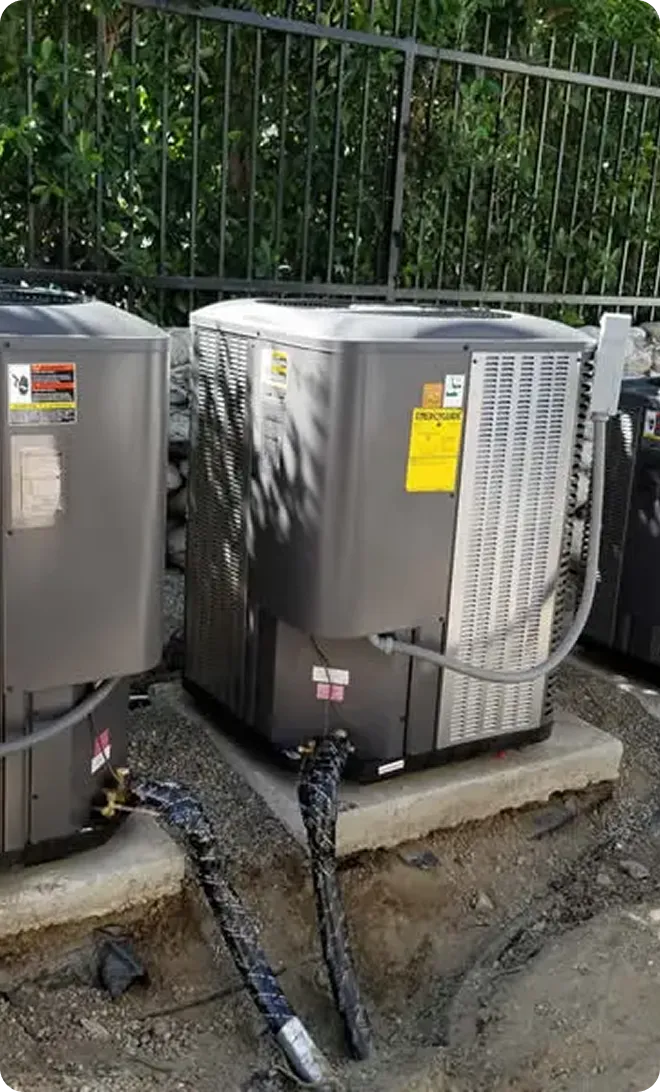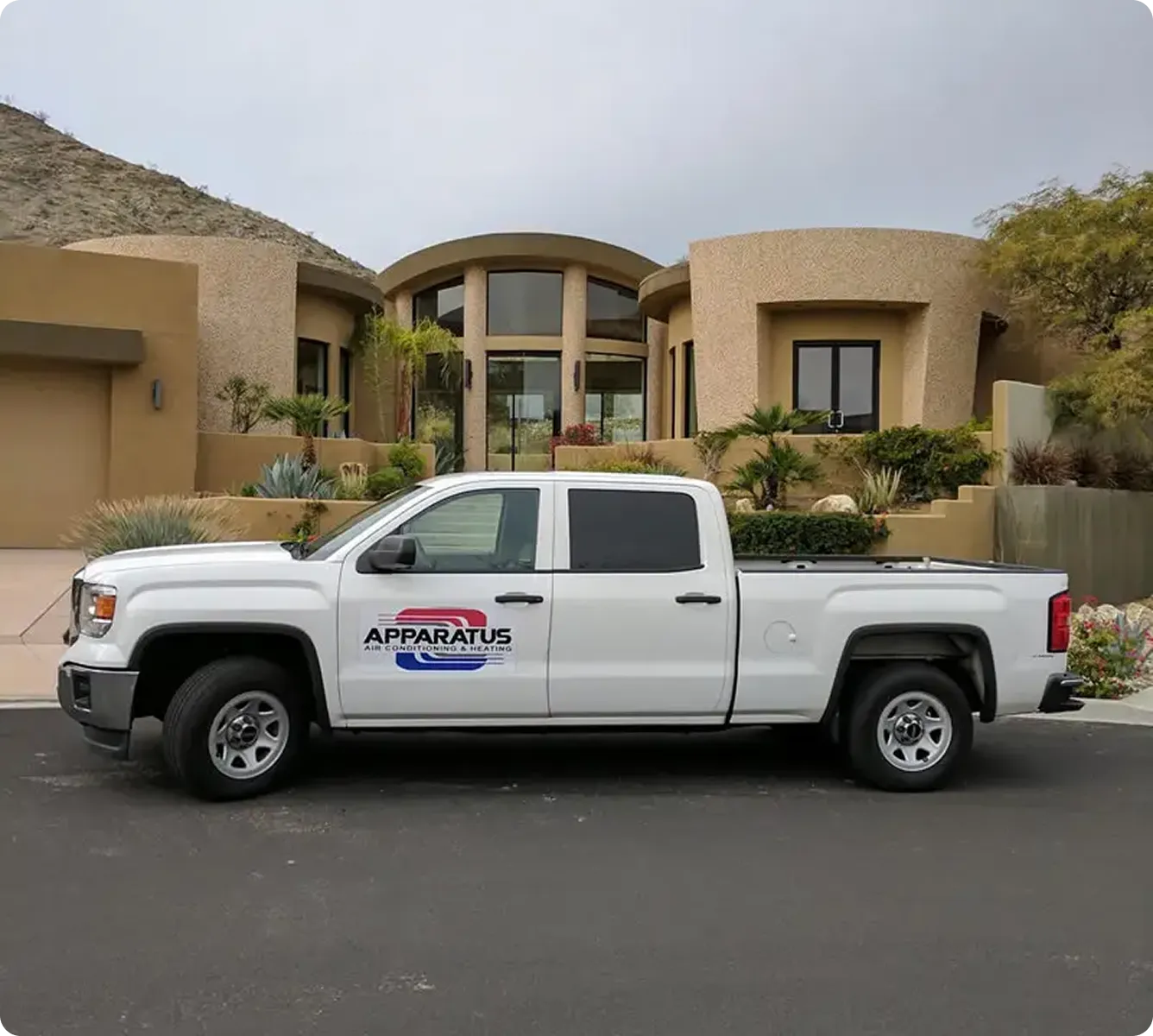
Mini Split Inspection in North Palm Springs, CA
Mini Split Inspection in North Palm Springs, CA
A thorough mini split inspection in North Palm Springs, CA protects comfort, reduces energy bills, and prevents costly mid-summer failures. In this desert climate, mini split systems work harder and face unique stressors: extreme daytime heat, airborne dust and sand, intense sun exposure to outdoor heads, and seasonal storms that can introduce debris and insects. A comprehensive inspection identifies wear, safety risks, and efficiency losses so you can make an informed decision about repairs, replacement, or pre-sale disclosure.
.webp)
Why a Mini Split Inspection Matters in North Palm Springs
- High cooling demand in summer increases wear on compressors, capacitors, and fan motors.
- Desert dust and wind-blown grit quickly restrict airflow and coat indoor evaporator coils, lowering efficiency.
- Outdoor units mounted in direct sun or on non-ventilated walls run hotter and are more likely to suffer premature component failure.
- Infrequent use in milder months can hide refrigerant leaks or electrical degradation until peak season.A targeted inspection reduces the risk of system failure during extreme heat, improves indoor comfort, and provides documentation for buyers, sellers, or property managers.
What a Complete Mini Split Inspection Includes
A professional inspection follows a detailed checklist to capture visual, electrical, mechanical, and performance conditions. Typical steps include:
- Visual inspection
- Check indoor and outdoor units for physical damage, loose mounts, corrosion, and pest nests.
- Inspect line sets and insulation for cracks, UV damage, or exposed refrigerant lines.
- Examine condensate drain lines and pans for blockages, algae, or signs of water damage.
- Verify remote controls and thermostat sensors for proper placement and operation.
- Leak detection and refrigerant assessment
- Electronic leak scan around connections, flares, service valves, and evaporator/capillary areas.
- Record refrigerant type (R-410A or other), charge level, and note any evidence of past top-offs.
- Check for oil stains or residue indicating slow leaks.
- Electrical safety and controls
- Inspect disconnects, wiring, fuses, breakers, contactors, and capacitors for wear or heat damage.
- Measure line voltages and currents to evaluate motor draw and detect overloading.
- Confirm proper grounding and verify control wiring between indoor heads and outdoor condenser.
- Performance testing
- Measure supply and return air temperatures and calculate sensible cooling capacity.
- Test airflow and fan speeds at each indoor head; check for noise and vibration.
- Monitor compressor start-up behavior, run time, and temperature split across the evaporator.
- Evaluate thermostat calibration and control responsiveness.
- Safety and code-related checks
- Verify proper condensate disposal to avoid mold or structural damage.
- Confirm outdoor unit clearance, secure mounting, and protection from direct sun or flooding.
- Note if refrigerant handling, labeling, or service ports comply with current regulations.
Pre-Season and Pre-Sale Evaluation Reports
Inspections can be tailored as a pre-season tune-up or a pre-sale disclosure. A professional report typically includes:
- Executive summary: overall condition and immediate risks.
- Detailed checklist results with photos of problem areas (coils, connections, drain pans, wiring).
- Measured system performance: temperature differentials, voltages, amp draws, refrigerant pressure and charge status.
- Estimated remaining useful life for major components (compressor, fan motors, PCB boards).
- Prioritized repair and maintenance recommendations separated into:
- Safety-critical fixes to address immediately.
- Efficiency and reliability repairs recommended within the next 6-12 months.
- Long-term replacement options if the unit is near end of serviceable life.
- Estimated repair scope and typical cost ranges for each recommendation (presented as categories rather than fixed prices), and an estimated timeline for completion.
These reports make it easy for homeowners, landlords, and real estate sellers to decide whether to repair, replace, or disclose issues to buyers.
Typical Findings and Recommended Solutions
Common mini split issues found in North Palm Springs homes and practical remedies:
- Restricted airflow from dusty filters and clogged evaporator coils
- Solution: deep-clean evaporator coil and replace or wash filters; schedule seasonal filter changes.
- Low refrigerant or slow leaks
- Solution: perform leak detection, repair or replace leaking components, then recover and recharge refrigerant with certified handling.
- Start-up failures or weak compressor performance
- Solution: test and replace capacitors, contactors, or failed compressors; assess for refrigerant-related damage.
- Corroded electrical connections and stressed wiring
- Solution: tighten or replace terminals, secure proper overcurrent protection, and re-evaluate load balancing.
- Condensate drain clogs and water intrusion
- Solution: clear drain, treat with biocide if needed, and re-route or add traps to prevent overflow.
- Outdoor unit overheating from sun exposure or poor ventilation
- Solution: relocate or provide shading/ventilation improvements, correct mounting, and ensure adequate clearances.
Each recommended solution in the inspection report is explained in plain language, with the urgency level and how the repair will affect comfort and operating costs.
Compliance, Safety, and Refrigerant Handling
Inspections include checks to help ensure compliance with safety and regulatory expectations:
- Proper refrigerant handling by EPA-certified technicians when recovery or recharge is necessary.
- Verification that system labels identify refrigerant type and pressure ratings.
- Electrical safety checks to reduce fire risk from degraded wiring or overloaded circuits.
- Recommendations for permit needs when a replacement or major alteration is proposed, based on local code patterns for HVAC work in the Palm Springs area.
Benefits of Timely Inspections and Ongoing Maintenance
- Prevents costly failures during peak heat by identifying failing components early.
- Improves energy efficiency and can lower monthly cooling costs by ensuring correct refrigerant charge, clean coils, and proper airflow.
- Extends system life by reducing compressor and motor stress.
- Provides documented condition reports useful for selling property or planning capital improvements.
- Enhances safety by identifying electrical hazards and condensate issues that can lead to mold or structural damage.
Maintenance Tips for North Palm Springs Homes
- Change or clean filters every 1-3 months during heavy use. Desert homes will need more frequent attention.
- Keep outdoor units clear of sand, debris, and direct sun where possible; provide screened protection against wind-blown grit.
- Schedule a full inspection and tune-up before the cooling season and again after monsoon season if your location experiences summer storms.
- Watch for early warning signs: reduced airflow, warm spots in conditioned spaces, unusual noises at startup, or higher-than-normal energy bills.
A mini split inspection in North Palm Springs, CA gives you a decision-ready picture of system health—what must be fixed now, what can wait, and what replacement options make sense for your budget and comfort needs. The inspection report provides clear, prioritized recommendations and the technical details you need to move forward confidently.

hear what our satisfied
clients have to say









.webp)